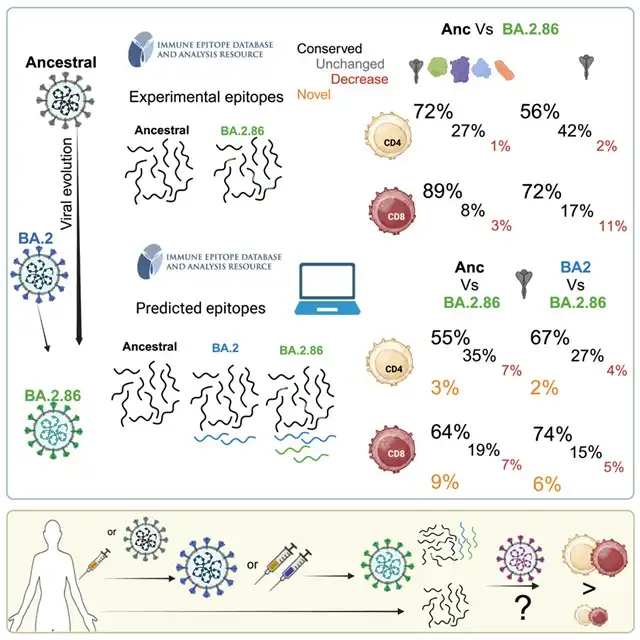T Cells Still Potentially Our Weapon Against Latest COVID Variant BA.2.86
- Normal Liver Cells Found to Promote Cancer Metastasis to the Liver
- Nearly 80% Complete Remission: Breakthrough in ADC Anti-Tumor Treatment
- Vaccination Against Common Diseases May Prevent Dementia!
- New Alzheimer’s Disease (AD) Diagnosis and Staging Criteria
- Breakthrough in Alzheimer’s Disease: New Nasal Spray Halts Cognitive Decline by Targeting Toxic Protein
- Can the Tap Water at the Paris Olympics be Drunk Directly?
T Cells Still Potentially Our Weapon Against Latest COVID Variant BA.2.86
- Should China be held legally responsible for the US’s $18 trillion COVID losses?
- CT Radiation Exposure Linked to Blood Cancer in Children and Adolescents
- FDA has mandated a top-level black box warning for all marketed CAR-T therapies
- Can people with high blood pressure eat peanuts?
- What is the difference between dopamine and dobutamine?
- How long can the patient live after heart stent surgery?
T Cells Still Potentially Our Weapon Against Latest COVID Variant BA.2.86
A new variant of SARS-CoV-2, Pirola (BA.2.86), is spreading globally, drawing attention due to its high mutation rate.
Researchers at the La Jolla Institute for Immunology are using the Immune Epitope Database (IEDB) to predict T cell responses to Pirola.
They found that existing vaccines and previous exposure to variants like Omicron still offer significant protection. While these results are promising, they are predictive and require further experimental validation.

Scientists at the La Jolla Institute for Immunology are utilizing bioinformatics to predict how T cells might adapt to combat the highly variable Pirola variant. Discovered in August this year among patients in Israel and Denmark, Pirola, also known as BA.2.86, has since been spreading globally. Its heightened variability is a cause for concern, comparable to the Omicron variant in contrast to the original SARS-CoV-2.
As Pirola spreads, researchers at the La Jolla Institute for Immunology (LJI) are investigating whether COVID-19 vaccines or previous exposure to SARS-CoV-2 can still protect against severe illness.
Professor Alessandro Sette, Ph.D., at LJI, stated, “There is concern that a virus with so many mutations might ‘evade’ T cell immunity.”
A recent study in the journal Cell Host & Microbe suggests that T cells can recognize Pirola’s mutations and target them. Assistant Research Professor Dr. Alba Grifoni said, “Our analysis indicates some positive news, suggesting individuals previously exposed to Omicron or vaccinated with the new bivalent vaccine may have T cells armed to generate specific responses against Pirola.”
In this study, Sette and Grifoni utilized the Immune Epitope Database (IEDB), a resource containing valuable research from immunologists worldwide describing how immune cells recognize fragments or “epitopes” on microbes.
Using the extensive data in IEDB, researchers have a detailed understanding of how T cells trained by COVID-19 vaccines or prior exposure to SARS-CoV-2 target epitopes on the virus. Extracting this IEDB data, they developed a bioinformatics pipeline to predict T cell responses to the Pirola variant.
Grifoni explained, “We simulated T cell responses to Pirola based on experimental data from previous SARS-CoV-2 variants and predictive data.”
Researchers found that the majority of T cells still targeted epitopes on Pirola:
- Overall, 72% of CD4+ “helper” T cell responses recognized fragments without changes between variants, and 89% of CD8+ “killer” T cell epitopes remained unchanged.
While conservative T cell epitopes on Pirola’s “Spike” protein were fewer, expected due to its high mutation rate, 96% of CD4+ “helper” T cell epitopes and 62% of CD8+ “killer” T cell epitopes were similar. T cells still have the potential to recognize them.
In summary, if Pirola wants to evade T cells, it seems to be struggling.
Sette said, “Many epitopes recognized by the immune system remain unchanged in the new Pirola variant. The virus is predicted to still be recognized by T cells.”
Grifoni added, “T cells may also ‘follow’ new peptides from Pirola’s mutations, initiating new responses targeting these epitopes, similar to what we’ve seen with other variants. We haven’t observed more severe illness in cases of Pirola infection or other recent variants, and this could be one reason.”
Grifoni emphasized that these findings are predictive and not based on observed Pirola infections. Nevertheless, she believes observations and predictions aligning with recent actual studies are crucial. Experiment validation is still needed, but collaborations globally are already underway to investigate this issue.
Sette added that many people are still susceptible to SARS-CoV-2, even with the Pirola variant. This emphasizes the importance of vaccination, especially with the latest vaccines.
Researchers are currently collecting experimental data to further understand T cell responses to variants and strengthen their predictive tools to understand how individuals vaccinated with bivalent vaccines and/or experiencing “breakthrough” infections respond to future variants.
T Cells Still Potentially Our Weapon Against Latest COVID Variant BA.2.86
Reference:
“Predicted Cross-Reactivity of Existing SARS-2 Specific T Cells Against BA.2.86” by Alessandro Sette, John Sidney, and Alba Grifoni, published on December 8, 2023, in Cell Host & Microbe.
DOI: 10.1016/j.chom.2023.11.010
(source:internet, reference only)
Disclaimer of medicaltrend.org
Important Note: The information provided is for informational purposes only and should not be considered as medical advice.



